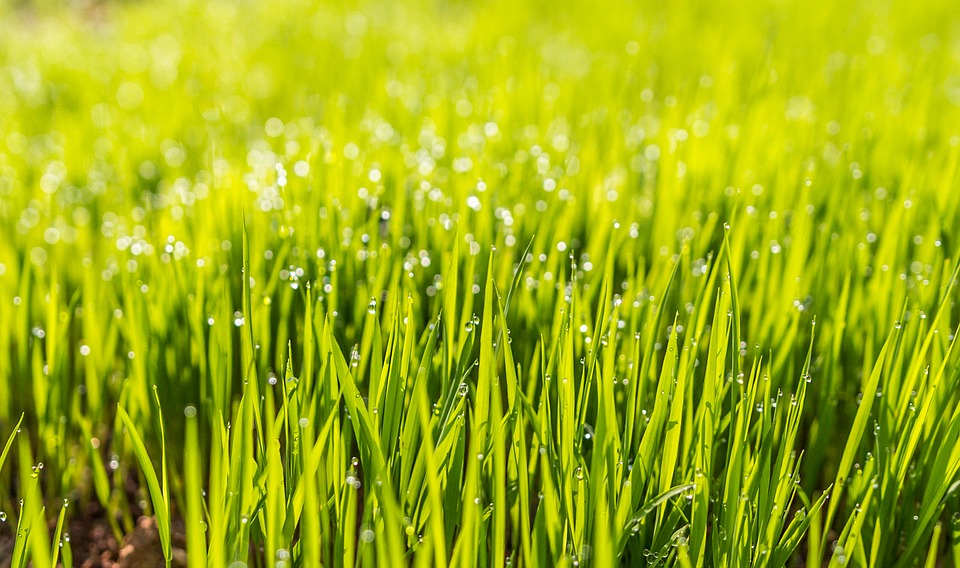
Much like a growing child, a Christmas turkey or a prize marrow at the county fayre, success in the garden can often come down to a solid feeding regime - particularly when it comes to growing a luscious lawn.
A nutritious diet is key to healthy growth for virtually all living organisms, and that includes the grass in your back garden. Neglecting to feed your lawn is a good way to turn the grass brown.
Don't force your lawn into a horticultural Hunger Games - keep it looking good with these lawn feeding tips from the pros here at Lawn & Weed Expert.
Tips for Feeding Your Lawn
When to feed a lawn
Lawns benefit hugely from regular feeding - just about everyone knows that - but exactly how you feed your lawn can vary depending on the time of the year.
During the wintertime, your garden won't grow much due to the low temperatures and overcast skies. On the plus side, this means less work for you!
Spring, however, is a different story. As the name suggests, this is the time to spring into action and get to work on prepping your garden for the summer sunshine that's just around the corner (in theory, at least - this is Britain, after all).
How to feed your lawn in spring
Over the course of spring, it's recommended that you begin to fertilise your lawn using your spring lawn feed of choice. The RHS suggests beginning this process in late March / early April.
This process will help invigorate your lawn and prevent weeds and moss from rearing their ugly heads. If your grass begins to lose its colour as the months wear on, repeat the process between May and August.
Once you reach August, it's recommended that you stop this process altogether. The nitrogen present in lawn fertilisers can boost growth at the wrong time of year, leading to weather damage, pest problems and potential lawn disease later down the line.
When fertilising your lawn, it's also vital not to over-fertilise. An overly liberal spread can lead to a number of issues, ranging from pest problems to grass discolouration (a.k.a. fertiliser burn).
Feeding your lawn in the summer
During bouts of hot weather, grass can become stressed as a result of the heat. Fertilising your lawn during these periods can be costly as the dry conditions can make the grass more susceptible to fertiliser damage.
If you must feed your lawn during these periods, wait until there has been a spell of rainfall and let the grass soak up the moisture before you try feeding your lawn again. If the weather allows, you can feed your lawn at intervals of 6-8 weeks over the summer months, but beware of the aforementioned nitrogen issues
More Spring/Summer lawn feeding tips
If you have treated your lawn for moss, weeds or dead grass, you may want to over-seed the affected areas. Fork the area and rake before sowing the grass seed and watering accordingly.
Over-seeding can be tricky at times, particularly when it comes to matching the colour of the rest of your lawn. If the new patch does produce a different shade of green to the rest of your garden, you may want to over-seed the entire lawn to ensure consistency.
To maintain healthy moisture throughout the summertime (and other periods of sustained dry weather), watering once a week in the early morning can be a great way to ensure your grass keeps a healthy colour and doesn't dry out.
If wet weather is commonplace, avoid further watering to prevent your garden from becoming waterlogged and incurring water damage. This is particularly important for newly laid lawns as it can result in shallow rooting.
Lawn feeding tips for Autumn
Feeding your lawn during the autumn months with the relevant autumn feed can help prepare your garden for the impending cold weather. In the words of the Starks of Winterfell, winter is coming and your garden could use some protection.
Specialist autumn fertiliser or year-round lawn feed can give your grass a real kick in the...roots, preventing moss growth as well as strengthening it in preparation for the wet and frosty conditions to come.
If you liked our lawn feeding tips, you can find more resources like this at our Lawn Care Advice pages. Alternatively, why not arrange a FREE lawn survey and let us cater for your lawn with a feast to remember?
Request a FREE Lawn Survey
If you'd like to learn more lawn feeding tips or have any questions about anything that we have mentioned above, then please do not hesitate to get in touch with a member of our helpful team today - we'd be more than happy to help.